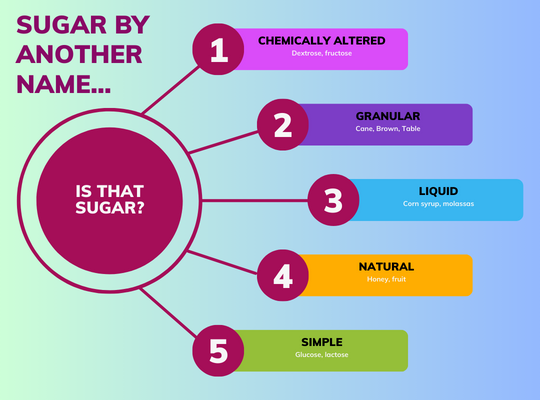If you’ve read our blogs, you know I have a personal beef with sugar. Added sugar was once my crutch in life. Stressed me turned to chocolate. If I celebrated something, I turned to cake. And when bored, I baked sweet stuff. It’s so addictive! And here’s my other beef with sugar – it can be difficult to identify. Because many of us are onto the fact that sugar is destructive, companies put it in the nutritional information with different names. I decided to do a blog series on the many names of sugar. First, let’s answer the question: what is fructose?
What is Fructose?
Fructose was originally discovered in 1847 by a French chemist. It wasn’t until 1884 that researchers started investigating its use as a sweetener. It is a naturally occurring sugar found in fruit, vegetables, and honey. Some of the common types of food that contain natural fructose are ones that taste sweeter and people tend to like, such as apples, grapes, watermelon, peas, and sweet onions.
When they extract fructose, it becomes a sweet, white, odorless crystal-like substance. Like dextrose that we talked about in our last blog of this series, it gets a bad rap when added to food to make it sweeter.
What is Fructose Used For?
Manufacturers use fructose for two reasons. Firstly, it’s sweeter than table sugar (sucrose). You don’t have to add as much to get the same amount of sweet flavour. Secondly, it mixes well with liquids. So, you often find it in your sweetened juices and sodas. It’s also used in the making of high fructose corn syrup, but that’s a special kind of nastiness we’ll talk about in another blog.

How Does it Affect Your Body?
Like dextrose, the sugar we discussed last week, fructose is a naturally occurring sugar in its regular form. But, unlike dextrose, it doesn’t have a lot of impact on your blood sugars. It’s glycemic index is quite low. This is because you liver processes it before your body uses it. This has led some health professionals to see it as healthier than other sweeteners. But, again, it’s all about how you eat it.
Some people are sensitive to fructose. When they eat something with this sugar in it, they may experience stomach pain, diarrhea, and gas. If you’re partial to grapes but feel this way after eating them, you may be sensitive to the fructose in them.
Is Fructose Healthy?
When eaten naturally in whole foods, it isn’t a big deal for most folks. They say an apple a day keeps the doctor away. Apples contain fructose. Are you going to gain a lot of weight if you eat an apple a day? No, because apples also contain healthy vitamins and fiber. But, is it going to make your tastebuds crave foods that are sweeter? I think so.
Then you have added fructose, which is not great. It’s in things like molasses, sodas, juices, maple syrup, and jams – things you would naturally think you should restrict. But, it’s also in flavoured yogurt, granola bars, and applesauce. So, if you think you’re avoiding sugar, read the nutritional label.
What Are the Long Term Effects?
Fructose can lead to weight gain over the long term. Like I said above, when I ate sugar, I craved the sweeter fruits and vegetables. By itself, that’s not a big deal because they still had nutrients I needed and fiber to help my digestion of them. But, I also craved the sweeter starches, the sweeter sauces, and the sweeter condiments. Eating sweeter foods, even naturally occurring ones, can lead to obesity. And, obesity leads to inflammation, chronic disease, and type 2 diabetes.
Although it is low on the glycemic index, research shows it can lead to insulin resistance. Because your liver processes it before your body uses it, it can also lead to nonalcoholic fatty liver disease. The fiber and nutrients in the whole foods may be good, but this form of sugar itself doesn’t do you any favours.
Wendy





